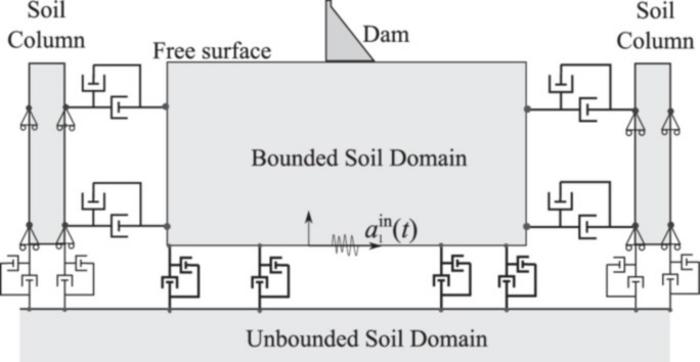In a significant advancement for geotechnical engineering, a refined space-time finite element method (v-ST/FEM) has been introduced to tackle the complex dynamics of soil-structure interaction during seismic events. This new approach allows for more accurate simulations of the response of earth structures to earthquake vibrations, marking a crucial step in improving infrastructure resilience against natural disasters.

Credit: International Journal of Mechanical System Dynamics
In a significant advancement for geotechnical engineering, a refined space-time finite element method (v-ST/FEM) has been introduced to tackle the complex dynamics of soil-structure interaction during seismic events. This new approach allows for more accurate simulations of the response of earth structures to earthquake vibrations, marking a crucial step in improving infrastructure resilience against natural disasters.
Designing structures like dams, tunnels, and embankments to withstand transient loads from sources such as earthquakes, high-speed trains, and explosions requires robust dynamic soil-structure interaction (SSI) analysis. Traditional methods often fall short in handling complex boundary conditions and dynamic responses. The demand for precise SSI solutions is growing, especially given the impact of local soil conditions on seismic motion characteristics. Due to these challenges, it is necessary to conduct in-depth research on advanced numerical methods to enhance the accuracy and reliability of SSI analysis.
Researchers from Kyoto University have introduced a velocity-based space-time finite element procedure in the International Journal of Mechanical System Dynamics. Published (DOI: 10.1002/msd2.12106) on June 4, 2024, the study presents a methodical approach to truncate unbounded soil domains and model energy flow during seismic activities, offering a significant leap forward in dynamic SSI analysis.
The study introduces a velocity-based space-time finite element method (v-ST/FEM) to address dynamic SSI problems. This innovative method incorporates viscous boundary conditions based on the Lysmer-Kuhlemeyer model, effectively truncating the unbounded soil domain to prevent spurious reflections. The v-ST/FEM method accurately simulates seismic input motion as an effective nodal force vector in numerical simulations, ensuring energy flow from the far field to the computational domain. The researchers validated this approach by comparing the seismic response of a concrete gravity dam on an elastic half-space with results from the semidiscrete finite element method (FEM) using the Newmark-β method. The v-ST/FEM method demonstrated superior accuracy and stability in long-duration seismic motion simulations, making it a reliable tool for future SSI analyses and improving the prediction of seismic performance for various structures.
Dr. Vikas Sharma, the lead author of the study, emphasizes the importance of this research, stating, “Our v-ST/FEM approach offers a more accurate and computationally efficient method for dynamic soil-structure interaction problems. This advancement is crucial for developing infrastructure that can better withstand the forces of nature, ultimately safeguarding lives and property.”
The application of this research is far-reaching, particularly for the design and assessment of earth structures such as dams and embankments in seismic zones. By providing a more accurate prediction of seismic soil amplification, the v-ST/FEM can contribute to the creation of safer and more resilient infrastructure, potentially saving lives and reducing the economic impact of earthquakes.
###
References
DOI
Original Source URL
Funding information
This work was supported by JSPS KAKENHI Grant-in-Aid for Scientific Research (B) (Grant Number 21H02304).
About International Journal of Mechanical System Dynamics (IJMSD)
International Journal of Mechanical System Dynamics (IJMSD) is an open-access journal that aims to systematically reveal the vital effect of mechanical system dynamics on the whole lifecycle of modern industrial equipment. The mechanical systems may vary in different scales and are integrated with electronic, electrical, optical, thermal, magnetic, acoustic, aero, fluidic systems, etc. The journal welcomes research and review articles on dynamics concerning advanced theory, modeling, computation, analysis, software, design, control, manufacturing, testing, and evaluation of general mechanical systems.
Journal
International Journal of Mechanical System Dynamics
Subject of Research
Not applicable
Article Title
Space–time finite element method with domain reduction techniques for dynamic soil–structure interaction problems
Article Publication Date
4-Jun-2024
COI Statement
The authors declare that they have no competing interests.



